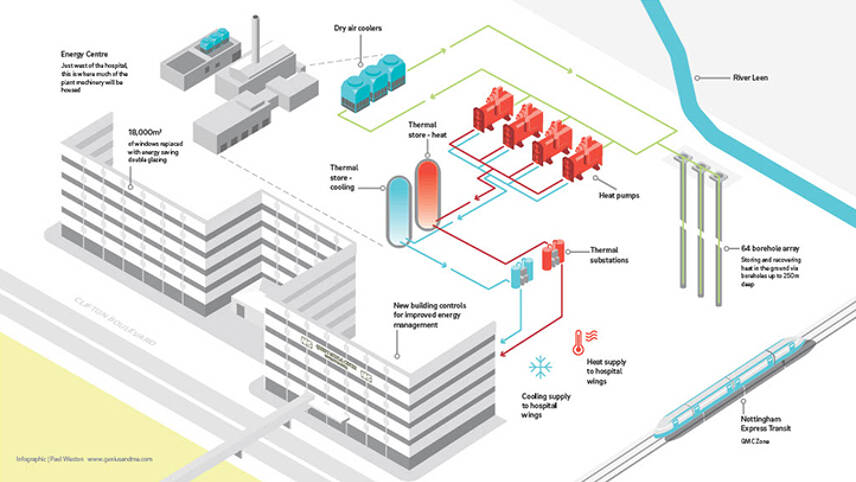This premium content is exclusive to edie Members.
To find out more about edie Membership, please click below.
If you are an existing member, login here

At a glance
Who: The Nottingham University Hospitals NHS Trust, in partnership with E.ON
What: Insulation improvements, smart building controls and renewable heating
Where: The Queen’s Medical Centre campus, Nottingham
When: From September 2023
Why: To reduce energy costs, slash energy-related emissions and improve comfort for staff, students and patients
The challenge
The NHS’s overall climate commitment is to cut emissions across all scopes by 80% by 2032, or sooner if possible, on the road to net-zero by 2040. The Government estimates that around half of NHS Trusts are not on track to deliver this level of decarbonisation. A key challenge is addressing emissions from heating and cooling without impacting the capability of a medical facility to operate.
The solutions
The Trust will replace many single-glazed windows with double-glazing. This will improve the energy efficiency of the Queen’s Medical Centre while also helping to shield those onsite from low and high temperatures, improving comfort.
Once this energy efficiency improvement is made, the building will be ready to shift to a low-carbon heating and cooling system powered by renewables. The Trust has worked with E.ON to select an on-site geothermal energy centre, which will fuel heat pumps, as the appropriate solution.
How the project works
In the first instance, The Trust will replace up to 18,000 square metres of single-glazed windows with double-glazed ones. Project partners for this phase of works include Acorn Aluminium and Wilmott Dixon.
Project partners have stated that replacing miles of windows in a live hospital recovering from the Covid-19 backlog has been challenging but necessary.
After the windows are in place, work will begin on the energy centre. E.ON will oversee the boring of 64 boreholes, descending up to 250 metres, to tap into the natural warmth of the earth (geothermal heat). This heat will be circulated using four new electric ground-source and air-source heat pumps. The system will also capture and recirculate heat that would otherwise have been wasted.
The first phase of the energy centre development will install a 4MW heat pump with 2.88MW cooling capacity to support the QMC’s existing gas turbine and standby boilers.
Phase two will increase the heat pump solution to 8MW of heating capacity and a further 5.8MW of new cooling capacity.
To help staff on-site monitor the performance of the new heating and cooling systems, E.ON Control Solutions will fit and manage a new digital building energy management system (BEMS). The system will use digital real-time tracking and predictive analytics to optimise performance and assist with the early detection of any inefficiencies. This is particularly interesting to public sector players as the energy price crisis rolls on; many have seen bills double or even treble over the past two years.
The results
The project is expected to reduce the site’s carbon emissions by 30% per year on 2022 levels once phase one is complete. This is equivalent to around 10,000 tonnes of CO2.
Once phase two is complete, the reduction will increase to 43% against the same baseline.
Nottingham University Hospitals NHS Trust chief executive Anthony May has stated that the project is “hugely important” to the delivery of the Trust’s net-zero plan, which feeds into the broader NHS England net-zero trajectory.
Business benefits
As noted above, Nottingham University Hospitals NHS Trust is expecting significant benefits in terms of carbon savings. It will also contribute to the delivery of waste reduction goals due to the reuse of the heat.
While the upfront cost of the project is high, it is also expected to save operational energy costs in the long run and build in resilience for the Trust against future shocks like the current energy crisis. The Trust has stated that it was looking for technology options to increase its security of energy supply in the context of a congested city centre, where solar, for example, was not the most efficient option.
Additionally, the Trust will track an expected improvement in patient and staff comfort relating to the improved thermal efficiency.
Investment
The total project cost comes in at £64m. The heating and cooling system itself will cost £15m, accounting for technology and infrastructure costs.
Nottingham University Hospitals NHS Trust is the largest recipient of funding from the third phase of the UK Government’s Public Sector Decarbonisation Scheme, which funds energy efficiency and clean energy projects across the UK’s public sector buildings. This grant will cover the majority of the upfront costs for this project.
Industry context
The UK Government has set a 2040 net-zero target for NHS England operations and supply chains, which is ten years sooner than the overarching national target. There is an interim requirement for emissions across all scopes to be cut by 80% by 2032.
All NHS Trusts are having to develop and implement plans to accelerate decarbonisation. Most are keen to do so, given the link between the climate crisis and public health.
The current energy price crisis has doubtless prompted many organisations in the public sector to explore on-site low-carbon energy solutions. The British Medical Journal stated in autumn 2022 that hospital energy bills for the year ahead were likely to be £24m higher year-on-year.
Nonetheless, the delivery of low-carbon energy projects comes with a number of context-specific challenges – despite the support offered through the Public Sector Decarbonisation Scheme. These include fitting energy-related technologies in operational medical facilities without disrupting the vital work being undertaken; drawing up funding plans without private sector support and ensuring required levels of collaboration with other local organisations including councils.
© Faversham House Ltd 2024 edie news articles may be copied or forwarded for individual use only. No other reproduction or distribution is permitted without prior written consent.

